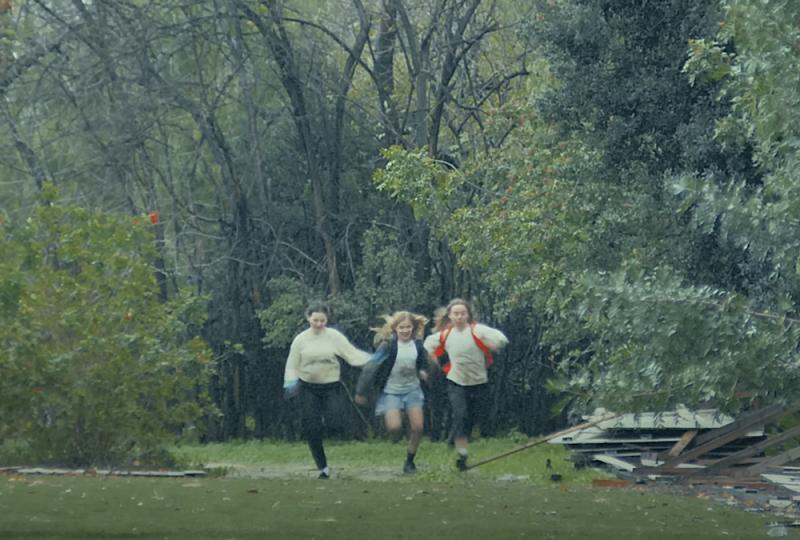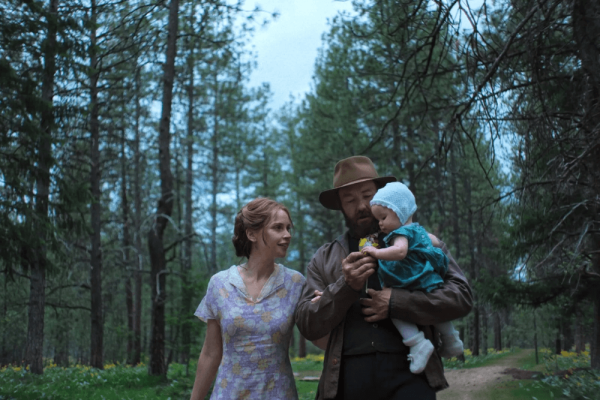AT THE CLOSE of the music video for “$20,” all three bandmates of boygenius — the young indie band turned chart-topping supergroup — cut their palms and swear a blood oath to each other. As I watched it for the first time, I couldn’t help but feel drawn toward prayer — is this what love looks like? It is subversive to hold on to the tenderness of friendships in a world rife with violence. But boygenius, consisting of Julien Baker, Phoebe Bridgers, and Lucy Dacus, refuses to do anything less in their debut full-length album the record — a searing homage to their love for each other. It is nothing short of divine.
Ringing with angst and affection, these songs meld post-grunge guitar riffs with heartfelt existential threads. In “Satanist,” they respond to ruminations in Ecclesiastes 1:2, “Everything is meaningless,” by singing, “If nothing can be known, then stupidity is holy.” By embracing the finitude and vapor of our existence, they, like the Teacher in Ecclesiastes, “[make] peace with [their] inevitable death” (from the song “Anti-Curse”).
Yet, amid all the nihilism, there’s joy. Boygenius’ gushing piano ballad “Letter to an Old Poet” nods to Rainer Maria Rilke’s Letters to a Young Poet, in which the Austrian writer and mystic offers this instruction: “Believe in a love that is being stored up for you like an inheritance.” Boygenius finds this love in friendship.
In boygenius’ the film (directed by Kristen Stewart), the nostalgia-ridden short of three songs from the record, Baker, Bridgers, and Dacus (who refer to themselves as “the boys”) run through liminal dreamscapes while their songs play in the background. They traverse an array of memories, switching fluidly and sporadically between their child selves and adult selves: They set houses on fire, sing softly in front of monster trucks, and cuddle each other on the bed inside an abandoned house they painted blue. But underneath the loud percussion and the agonized screaming, boygenius speaks right through the dissatisfaction of not being known, and conversely, the mortifying vulnerability of being fully known: “It feels good to be known so well. I can’t hide from you like I hide from myself,” sings Dacus in the moving-away-from-home soundtrack “True Blue.” The record invites us to lean in — to neither fear nor shy away from intimacy.
In “Without You Without Them,” Dacus sings softly, tenaciously, “Speak to me / until your history’s no mystery to me.” As Baker and Bridgers join in, the vulnerability is reflected in the a cappella arrangement, pointing to the holiness of friendship. It is both a confession and an appeal: “I want to hear your story / And be a part of it.” It’s a desire to know and be known, to insert oneself into the narrative of other people’s lives, even briefly. There is a palpable creativity and joy found only in fellowship.
Boygenius forms a sort of Trinity of love. At the beginning of the world, God, Christ, and the Holy Spirit were a community, dancing all things into existence. Such harmony and movement required a deep intimacy. We see this in Romans 8:27: “[God] who searches our hearts knows the mind of the Spirit,” and in John 7:29 when Christ says, “I know God, because I am from God, and God sent me.” The members of the Trinity grasped the fullness of their identities. As image bearers, we are also fashioned to long for this level of communion.
culture.boygenius.inline1.jpg

I didn’t always have this. When, at the age of 18, I emigrated from the urban landscape of Manila, the Philippines, to a small college town in Wisconsin, I was disoriented by the whiplash of postcolonial upbringings and American dreams. I was uprooted from my homeland because there was a demand for Filipino nurses in the U.S., and my mother was one. My family fit as much of our lives as we could into two suitcases. But I missed the Pacific, and addressed this longing with two majors, three jobs, and an array of activities that could be easily itemized to fill a résumé. Sitting on the floor of my college dorm, gnawing at my loneliness, I found God: I discovered an Asian American Bible study at my university. Only then did it dawn on me that self-sufficiency is a capitalistic lie. I need community.
In the belly of empire, my friends were my salvation. They loved me beyond the works of my hands and the long labors of my body. “I remember who I am when I’m with you,” boygenius sings with cosmic harmonies in “True Blue” — they are each other’s soulmates even when home becomes transient. In the diaspora, incarnational community was and continues to be my true north. Community grounds me. My friends have built a cathedral around me, and I have found in them refuge and joy.
Friendship is the through line of boygenius’ cathartic music. They populated each other’s memories and haunted one another’s dreams to create something beautiful and surreal. It is both terrifying and marvelous to be known so well.
There are several different Greek words for “love” in the New Testament. In a world that most often celebrates eros (romantic love) and storge (familial love), Jesus — and boygenius — shine a spotlight on one of the more overlooked forms of love, taking time to celebrate philia, or sibling love. Philia love is often characterized by affection, warmth, and friendship. The celebration of it is what makes the record unique. Love songs are common; love songs to friends are rare. Because of this, the record is a transgressive album reminding us to love our friends because they are our perennial home.
Baker, Bridgers, and Dacus have created a lingua franca for philia love, a hymnary for community. In one of the most stripped-down songs of the album, “We’re In Love,” Dacus sings a promise: “There is somethin’ about you that I will always recognize / And if you don’t remember / I will try to remind you of the hummingbirds / You know the ones / And the baby scorpion / And the winter lunar halo / And the walk we took in the Redwoods. / I could go on and on and on and I will.”
Friendship is a type of love that we should go on and on and on about, for it is eternal.

Got something to say about what you're reading? We value your feedback!







